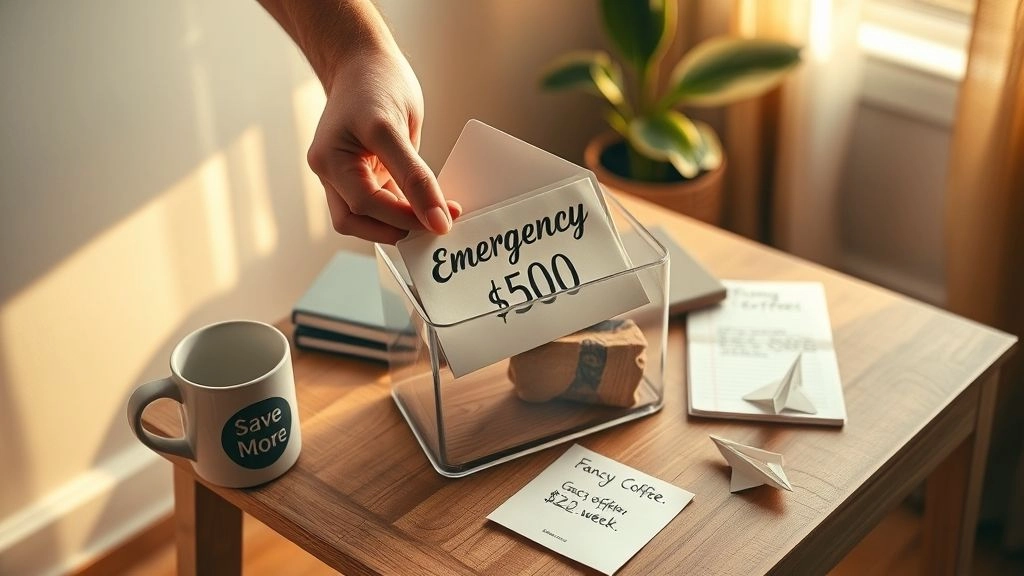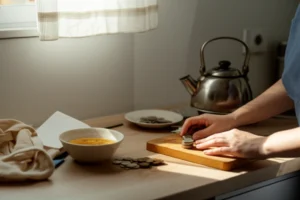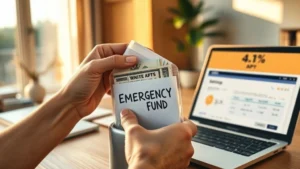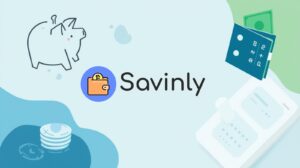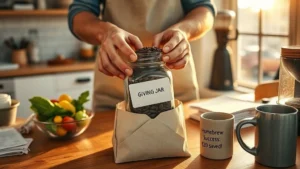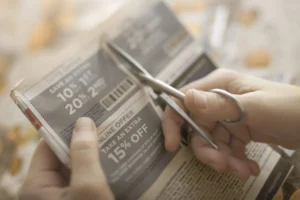Why Save? Why Now?
Have you ever found yourself staring down a surprise bill—maybe a popped tire or a feverish kid—knowing your bank balance is, uh, pretty much on E? Happens to the best of us. It’s like the universe waits for your finances to feel shaky, then sends life’s little “gotcha” moments just to mess with you. I’ll admit, the first time I realized adulting meant actually being prepared for that… let’s just say, it was not my proudest week.
But here’s the thing: the answer isn’t complicated spreadsheets or skipping every little treat. Nope. The first foundation is save answers—literally, learning to stash away just enough so life’s messes stop feeling like full-blown disasters. You don’t need to be a genius, you just need a plan and a little stubbornness. And coffee, probably. Always coffee.
Is $500 Really Enough?
Wait, Just $500?
Maybe $500 doesn’t sound like much. Maybe it feels impossible right now. Totally get it. But this isn’t about building a fortune overnight. It’s about covering the basics—the stuff that tends to knock us off course: a flat tire, a doctor visit, a last-minute flight. Not glamorous, just… solid. Do-able. Enough to keep you from sliding into panic mode or reaching for a loan you’ll regret. (You know what’s worse than an emergency? Stressing about if you make a late credit payment, you might see the lender add more headaches to your bill. Not fun.)
My Embarrassing Little Fund
I started my emergency fund in an actual shoebox. Yep, real cash. It wasn’t impressive—just the bits and pieces I could scrounge after bills. But I’ll never forget the feeling the first time I used it: car battery died in winter, I handed over $150 in cash, and the mechanic said, “Wish everyone was this prepared.” Had to laugh (mainly in relief), but also—honestly, it made me want to keep going.
What If Life Gets Tougher?
Can $500 Really Fix Things?
Not everything, obviously. But it stops that first domino—the one that leads to panic, expensive payday loans, or racking up credit cards. Down the road, yeah, you want more of a cushion. Three to six months’ expenses is the dream. But you have to start before you run, right?
If you want super clear step-by-steps on how to set that base, check out The first foundation is save answer key. Seriously, sometimes you just need the instructions.
Cut Sneaky Expenses (Don’t Panic)
Those Everyday Dollars
You ever look at your bank statement and think, “How did I spend so much on nothing?” Yeah… me too. Turns out, it’s the five-dollar coffee runs, the “treat yourself” snacks, streaming subscriptions you forgot existed. I did a week-long “budget diary” and wow—turns out gas station drinks are a silent assassin. Anyone else?
Quick Savings Table
| Expense | Weekly Cut | Monthly Savings |
|---|---|---|
| Fancy Coffee | $20 | $80 |
| Extra Streaming | $10 | $40 |
| Takeout | $30 | $120 |
Not saying “never treat yourself.” Just—maybe treat yourself in a way that actually feels special (like, saved up for it), instead of out of habit.
Real-Life Swap
Last summer, I switched my daily store-bought iced coffee for brewing at home—with embarrassingly uneven results, some days. But, truly? By September, I’d stacked more than $150, which planted my emergency fund. It wasn’t always delicious, but it worked. What’s your sneaky expense?
Automate and Chill
The Lazy Person’s Secret Weapon
If there’s one hack I’ll scream from the rooftops: automate it. Whether you’re the spreadsheet type or just want to set it and forget it, auto-transfers are the best friend you didn’t know you needed (I certainly didn’t). Even if it’s $10 a week. You won’t notice it’s gone, but you’ll absolutely notice when you hit $500.
Worried About Overdrafts?
Been there. Setting up an alert on your phone helps. Also, a separate savings account (even a high-yield online one) can keep that money “out of sight, out of mind.” Most banks let you transfer small amounts on a schedule. Little moves = big changes.
Also, you avoid those sneaky fees—because honestly, if you make a late credit payment, you might see the lender add silly extra charges just when you need it least. That’s money wasted for no good reason.
Pitfalls: Don’t Let Them Get Ya
Impulse… the Silent Savings Killer
Ever walk into Target for dish soap, walk out with $65 of stuff you didn’t know you needed? Yeah, me too. Next time you catch yourself reaching for a “little treat,” try the Hold Test: leave it in your cart for a day (sometimes I even hide it in my closet—a trick I stole from a friend). Nine times out of ten? I totally forget about it, and the emergency fund wins.
Impulse Buy Table
| Impulse Item | Cost | Emergency Fund After Skip |
|---|---|---|
| Phone Charger (again?) | $15 | $80 |
| T-shirt I’ll Never Wear | $12 | $92 |
| Random Decor | $20 | $112 |
Ignoring the Next Steps: Big No-No
So, you hit your $500 target—high five! What now? Don’t stop. Next up: crush your debts, and keep growing your savings muscles. If you’re feeling stuck, I found The Second Foundation Get out of debt and to be a great (actually attainable) place to start climbing out. You don’t need every answer today—just the next right move.
Growing Your Wealth—Without Being “Rich”
How Does This Little Fund Lead to Wealth?
Okay, get this: once you’ve proven to yourself you can save $500, you’re kind of unstoppable. Because now, you don’t have to start all over every time life throws a wrench your way—and the money you would have used to bail yourself out? That can now work for you. Saving, then paying off debt, then investing—that’s a real path. (And yes, it totally counts as adulting.)
When you finally move past survival mode, you can start thinking bigger—like growing wealth or even giving back. There’s a reason the “five foundations” work in order: first, save answers; eventually aspire to the fifth foundation: build wealth and be outrageously generous. Don’t worry, one step at a time.
Side-by-Side: With or Without Savings
| With Emergency Fund | Without Emergency Fund | |
|---|---|---|
| Car dies | Pays for repair; stress-free. | Credit card debt rises; more stress. |
| Unexpected bill | Buys time to breathe and plan. | Misses payment; risks penalty feeds (if you make a late credit payment, you might see the lender add more pain). |
| Job loss | Can cover rent for a while. Options. | Instant panic. Scrambling for loans or help. |
Compound Interest—A Wee Bit of Magic
Let’s not get all “ultra-rich guru” here, but seriously, compound interest is legit. Say you keep tossing $25 a week into savings. That’s $100 a month, $1,200 a year—before you’ve touched interest! In five years, with a little growth, you’ll be amazed at what you’ve built. And the confidence boost? Priceless. You might not be lottery-winner rich, but you’ll absolutely feel less frantic (and honestly, that’s the kind of wealth most of us actually want).
More on this whole “build wealth, be generous” mission? It takes time, but check out tips on the fifth foundation: build wealth and be outrageously—you’ll get there.
Let’s Get Real: This Is For Everyone
Small Stories, Big Wins
A friend of mine started saving after her toddler got the flu—she realized scrambling for co-pay cash isn’t a memory she wanted to repeat. She’s not “rich.” She’s careful. And now, she feels powerful—not because her fund is huge, but because she knows she can handle whatever’s next. These are the kind of wins that help you change your money story, one tiny triumph at a time.
If you crave more real-life “how did they do that?” vibes, browse The first foundation is save answer key. Seeing how different folks make it work is both humbling and oddly energizing.
Real Talk: Reflection Time
So… what’s your version of a stressed-out emergency? Is there a habit you could swap (just for a month)? What would it feel like—really, in your bones—to know you had a buffer, even a tiny one, before the car breaks down, not after?
Money stuff feels so big and scary until you find your footing. That’s why the first foundation is save answers, always. Even if your “answer” is duct-taped together at first.
In Closing: Your Turn
You’re still here? That means, deep down, you’re ready. Ready for those first little wins. For waking up to fewer “oh no!” moments, and more “aha, I got this” feelings. Building your emergency fund isn’t about being perfect; it’s about choosing your own peace (even if it’s one coffee at a time).
So, give it a shot. Pick an expense to cut or set up an auto-transfer (even $5 counts!). Celebrate your progress—seriously, it matters. Share your wins, no matter how small, with a friend. You can even drop your ideas in the comments. Who knows—you might inspire somebody else to start.
That’s what the first foundation is save answers really means: taking the smallest step so you’re ready when life gets weird… and maybe even surprising yourself along the way.
Now—it’s your move. What’s the next tiny step you’ll take?

